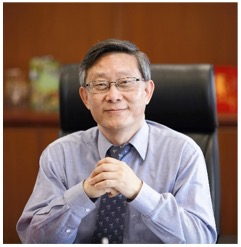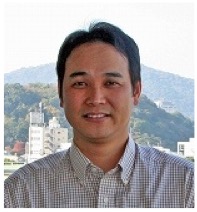Keynote Speakers

Prof. Hong Hocheng
President of National Tsing Hua University Taiwan
President of National Tsing Hua University Taiwan
Title: Crossing-Border Journey of E-Learning in Higher Education
Abstract:
E-learning is bound for growing dramatically thanks to its characteristics of being not limited by fixed time, space, pace and lecturer. This born nature empowers the approach to achieving some education goals not feasible otherwise. In the past human history since industrial revolution, the industry has progressed from 1.0 to 4.0, The society and talent demand correspondingly changed. The education did and will develop from 1.0 to 4.0. In each stage, the education crosses the border between generations, tribes, space, and knowledge domains. In this presentation, the path is examined, and a few examples of crossing-border e-learning are illustrated. A cross-university platform provides an opportunity for the freshmen-to- be after they get admitted to a college for learning in advance in another school. The on-line courses, bridging the sister schools, complementing to the programs of each other can reach to hundreds of thousand students. The students who accomplish the cross-major bachelor degree increase to nearly one quarter of the total graduates.
Speaker's Biography:
EDUCATION
- Ph.D., Mechanical Engineering, University of California (Berkeley), USA
- Diplom-Ingenieur, Manufacturing Engineering, Rheinland-Westfalien Technische Hochschule (Aachen), Germany
- B.Sc., Mechanical Engineering, National Taiwan University, Taiwan
EXPERIENCE
- Tsing Hua Chair Professor
Department of Power Mechanical Engineering
National Tsing Hua University - Deputy Minister
National Science Council (Now Ministry of Science and Technology)
HONOR & AWARD
- William Johnson Award (AMPT Conference, 2013)
- National Academic Prize (Ministry of Education, 2011)
- Outstanding Engineering Professor Medal (Chinese Institute of Engineers, 2009)
- Distinguished Research Fellow Award (National Science Council, 2005/2008)
- Fellow, American Society for Mechanical Engineers (ASME, 2005)
- Fellow, World Academy of Materials and Manufacturing Engineering (WAMME, 2005)
- Outstanding Professor Medal (Chinese Society for Mechanical Engineers, 2005)
- Outstanding Research Award (National Science Council, 2002/2000/1998)
- Outstanding Teaching Award (National Tsing Hua University, 1998)

Prof. Hiroaki Ogata
Academic Center for Computing and Media Studies Graduate School of Informatics at Kyoto University
Academic Center for Computing and Media Studies Graduate School of Informatics at Kyoto University
Title: Toward User-Centered Leaning Analytics in Higher Education
Abstract:
Recently, digital textbooks or electronic textbooks (i.e., e-books) were introduced to schools in many countries (e.g., Japan, Korea, Taiwan, and Singapore); this is especially true of K12 schools. For example, the Japanese Ministry of Education, Culture, Sports, Science and Technology compiled “The Vision for ICT in Education,” a comprehensive policy that promotes the utilization of information and communications technology (ICT) in education. As part of this policy, the Japanese government planned the introduction of e-books in all K12 schools by 2020, as well. In Korea, the research on e-books started in 1997; further, in 2007, the Korean Education and Research Information Service announced the e-book usage plan.
Most of the pilot studies focus on the introduction of e-books in schools. However, very little attention was paid to the analysis of e-book activity logs, although it is imperative to investigate how these logs can be used to improve e-book contents and the quality of learning and education. Once the logs of K12 e-book learning activities accumulate on a server, educational big data can be collected. The analysis of the big data, which include information from e-books and learning management systems (LMSs), is necessary for supporting and enhancing several learning activities. However, K12 schools do not have enough infrastructure for e-books and one-to-one computing devices.
In higher education, several institutions have enough infrastructure such as LMS, BYOD (bring your own devices), and wifi internet access in a whole campus. Thus, this talk will provide an overview of the Educational Data Science research project in higher education in Japan. This project proposes an information infrastructure for user-centered learning analytics (UCLA) by using Moodle, Mahara and an e-book system that allows students to browse e-books on any computing devices. User-centered LA (UCLA) is much more focusing on teachers and students’ needs and benefits. In UCLA, not only how to maximize the benefits of LA for teachers and students but also how to minimize the additional workload of teachers and students to do LA should be considered. This talk will show learning analytics tools and initial findings in our project.
Most of the pilot studies focus on the introduction of e-books in schools. However, very little attention was paid to the analysis of e-book activity logs, although it is imperative to investigate how these logs can be used to improve e-book contents and the quality of learning and education. Once the logs of K12 e-book learning activities accumulate on a server, educational big data can be collected. The analysis of the big data, which include information from e-books and learning management systems (LMSs), is necessary for supporting and enhancing several learning activities. However, K12 schools do not have enough infrastructure for e-books and one-to-one computing devices.
In higher education, several institutions have enough infrastructure such as LMS, BYOD (bring your own devices), and wifi internet access in a whole campus. Thus, this talk will provide an overview of the Educational Data Science research project in higher education in Japan. This project proposes an information infrastructure for user-centered learning analytics (UCLA) by using Moodle, Mahara and an e-book system that allows students to browse e-books on any computing devices. User-centered LA (UCLA) is much more focusing on teachers and students’ needs and benefits. In UCLA, not only how to maximize the benefits of LA for teachers and students but also how to minimize the additional workload of teachers and students to do LA should be considered. This talk will show learning analytics tools and initial findings in our project.
Speaker's Biography:
Hiroaki Ogata is a Professor at the Academic Center for Computing and Media Studies, the Graduate School of Informatics, Kyoto University, Japan. His research includes Computer Supported Ubiquitous and Mobile Learning, CSCL, CSCW, CALL, and Learning Analytics. He has published more than 300 peer-reviewed papers including SSCI Journals and international conferences. He has received APSCE Distinguished Researcher Award in 2014, and several Best Paper Awards such as WebNet1999, CollabTech2008, mLearn 2009, ICCE2010, ICCE 2014. and ICALT2015. Also he gave keynote lectures, e.g., at IEEE WMUTE2008 in Beijing, IETC2009 in Turkey, Mobile Learning 2009 in Spain, TeLearn2009 in Taiwan, ICCE2010 in Malaysia, NDT2012 in Dubai, KSET2012 at Seoul, IEEE CRTIT2013 in India, and ICHL2015 in China. He is an associate editor of IEEE Transactions on Learning Technologies (SSCI).